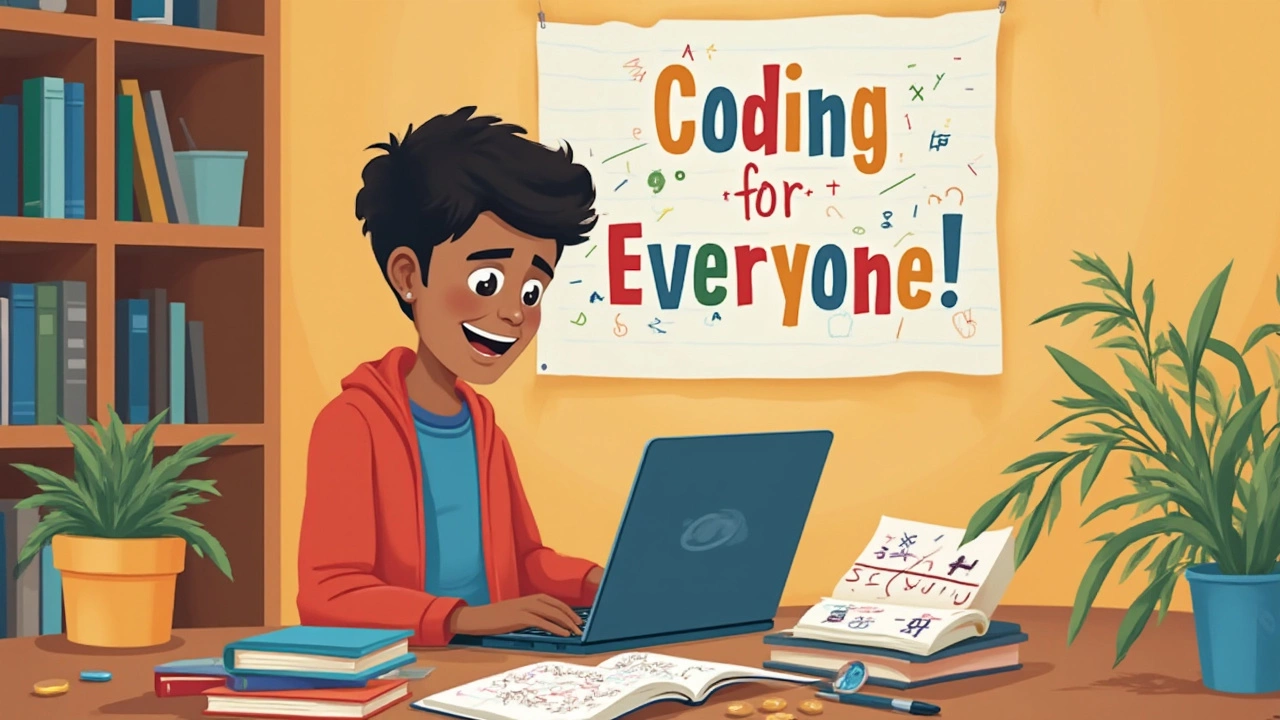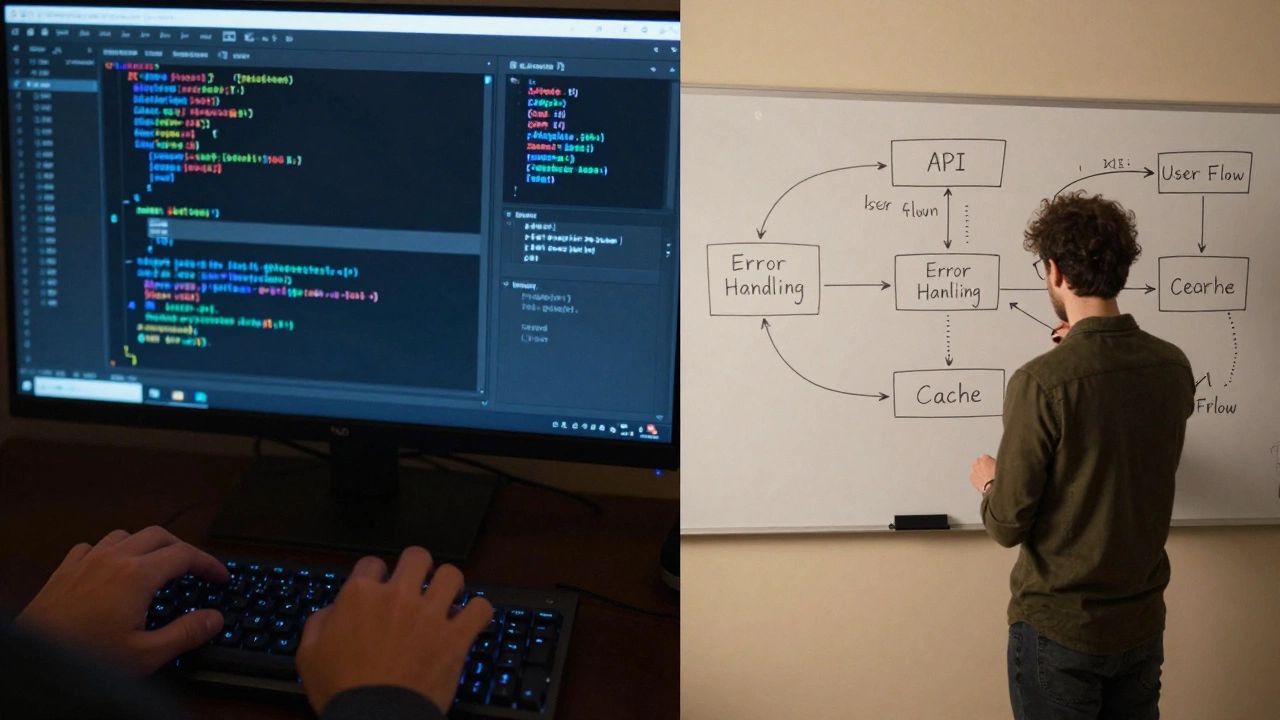Does Coding Involve Math? Breaking Down the Real Connection

Think you need to solve algebra equations every day just to code your first website? Spoiler: you don’t. A ton of people picture programmers as math geniuses, but that’s mostly hype. Most real-world coding is more about logic, breaking down problems, and clear thinking than about memorizing math formulas.
Whether you struggled in math class or just found it boring, you’re not locked out of learning to code. Actually, many folks who build successful apps or automate their work are just regular people who picked things up as they went. So if the idea of math gives you a headache, don’t count yourself out yet. There’s a lot more to this story than the usual stereotypes.
- What Coding Really Is
- How Much Math Do You Actually Need?
- Coding Jobs Where Math Does Matter
- Tips for Coding If Math Isn’t Your Strength
- Fun Facts: Surprising Ways Coding Uses Math
What Coding Really Is
People toss around the word “coding” like it’s a secret club, but stripped down, it’s just telling computers exactly what you want them to do. You write steps—the code—and the computer follows them. That could mean anything from making a web page look cool to controlling a robot’s arm in a factory.
Coding languages, like Python, JavaScript, or Java, are just tools for communicating with computers. Each one has its own style and rules. But the main idea stays the same: break a big problem down into tiny, clear actions. There’s a lot of trial and error. Everyone, even senior developers, spends a ton of time bug hunting and googling solutions.
Mistakes and testing aren’t signs you’re bad at coding—they’re part of the deal. People often imagine coding as typing wildly fast strings of letters and numbers. In real life, programmers are often working slowly, thinking ahead, and building stuff one step at a time.
If you’re wondering what kinds of things you can actually build, it’s a huge list. Here are some everyday examples:
- Websites and blogs (think of your favorite shopping site or recipe blog)
- Mobile apps (like ordering coffee or tracking your steps)
- Games (from Wordle to Call of Duty)
- Automation scripts (like sorting emails or collecting data)
- Smart home controls (turning on lights or adjusting your thermostat remotely)
Here’s a quick look at how people use coding and what percentage of their job involves actual “math math” (not logic):
| Job Role | Uses Coding? | Heavy Math Used Daily? |
|---|---|---|
| Front-End Web Developer | Yes | Rarely |
| Mobile App Developer | Yes | Sometimes |
| Data Scientist | Yes | Absolutely |
| QA Tester | Yes | Nope |
| Back-End API Developer | Yes | Occasionally |
The key thing? Coding and math aren’t the same. *Programming* is really about communicating ideas to computers in a way they get, solving problems step by step, and learning from mistakes. Don’t let talk of math scare you off—most coding classes are built for regular folks just like you.
How Much Math Do You Actually Need?
This is the question everyone wants answered before they dive into coding classes: how much math is actually involved? Here’s the straight answer—most people who learn to code only need basic math, like what you’d use for handling money, measuring stuff, or figuring out how many pizzas will feed the group. Everyday coding uses a lot more logic and problem-solving than it does tricky algebra or calculus.
Let’s break down when you’ll use math in coding:
- Basic arithmetic—Adding, subtracting, multiplying, and dividing. You’ll need this for things like scores in games or tracking inventory.
- Simple logic—If you can compare numbers and make decisions (like, “if the player’s score is higher… do this”), you’re in good shape.
- Percentages and averages—Useful for working with data, like figuring out averages or changes over time in apps.
If you’re building a website, making simple apps, or automating tasks, that’s most of the math you’ll see. Even experienced developers google math stuff if they forget how something works—it’s totally normal. Unless you’re planning on specialized fields like video game graphics, AI, or engineering software, deep math rarely comes up.
| Programming Type | Math Required | Examples |
|---|---|---|
| Web Development | Basic arithmetic, logic | Websites, e-commerce, blogs |
| Mobile Apps | Basic, sometimes averages | To-do lists, calculators, games |
| Data Science | Stats, some algebra | Data analysis, business insights |
| Game Development | Algebra, geometry, sometimes more | Graphics, animations |
| AI/Machine Learning | Linear algebra, calculus | Smart assistants, predictions |
Bottom line? Most beginners only need basic math for day-to-day coding. When you hit a wall, you’ll find plenty of online tools or code snippets to help you. So don’t let your old math grades scare you away. Coding is way more forgiving than math class ever was.

Coding Jobs Where Math Does Matter
Not every programmer spends hours doing math, but there are some roles where math is front and center. If you’re thinking about a career in game development, machine learning, or graphics programming, you’ll bump into a lot more math in your day-to-day work. In these fields, knowing the basics often isn’t enough—you’ll use specific topics like linear algebra, probability, and calculus.
Let’s look at a few coding jobs where math really comes into play:
- Game developer: Building game engines and working with 3D graphics involves a lot of geometry and trigonometry. You’ll often need to figure out how objects move and interact in a virtual world, which uses those math skills more than you’d expect.
- Machine learning engineer: Here’s where math gets really deep. You’ll use linear algebra, statistics, and calculus to design algorithms that actually learn from data. Think self-driving cars or voice recognition systems—the behind-the-scenes work is packed with number crunching.
- Data scientist: Crunching big numbers is the main game. You deal with stats, probability, and patterns all the time, building models to make sense of huge piles of information—like predicting what songs people want to hear next on a music app.
- Graphics programmer: If you’ve ever watched a Pixar movie and wondered how it looks so real, it’s because of math under the hood. Turning shapes into moving, shaded objects on your screen needs linear algebra and equations to make it happen.
That doesn’t mean most coding jobs require you to be a math expert. Web development, mobile apps, and most backend stuff just need basic arithmetic and logical thinking. But if you’re aiming for the jobs above, you’ll want to brush up on those math skills—at least the ones you’ll actually use. And here’s a pro tip: plenty of free online resources break down these topics for coders, so you don’t need to remember everything from high school.
So yeah, for some careers, being comfortable with math will open a ton of doors. But for most people starting in coding, you can totally kick things off and figure out the tougher math bits as you go.
Tips for Coding If Math Isn’t Your Strength
Don’t worry if your math skills aren’t top-notch. Tons of people successfully learn to code with only basic arithmetic and logic. In fact, most beginners in coding classes spend way more time memorizing syntax than wrestling with equations. Here’s how you can do well, even if you’re not a math fan.
- Lean into logical thinking. Being able to follow steps or spot patterns matters way more than calculating tricky numbers. If you’re good at puzzles, you’re halfway there.
- Choose beginner-friendly languages. Python is the most popular starter language, thanks to its simple structure and readability. HTML and CSS are also solid options if you want to see quick results.
- Use real-world examples. Skip the hypothetical math word problems. Build a simple calculator, make a to-do list app, or automate a small routine in your daily life. This makes concepts click faster and keeps you invested.
- Trust the built-in tools. Almost every language has functions and libraries that do the math for you. You rarely need to code math from scratch—learn how to use these tools instead.
- Ask questions early. There's no shame in Googling or hopping into forums. The coding community is probably the most helpful corner of the Internet for beginners.
| Area of Coding | Amount of Math Needed | Example |
|---|---|---|
| Web Development | Very Little | Creating an online shop or blog |
| Data Analysis | Some (Basic Arithmetic, Percentages) | Sorting sales numbers by date |
| Machine Learning | More (Algebra, Statistics) | Building a spam filter |
| Games/Graphics | Varies (May need some Geometry) | Moving objects on screen |
Remember, the most important skill you need is curiosity. Break problems into small steps and focus on real projects instead of textbook exercises. Keep at it, and you’ll get better through practice—not through crunching numbers.

Fun Facts: Surprising Ways Coding Uses Math
Most people think math and coding only mix for hardcore engineers, but the real picture is way more interesting. Did you know that video games use math for every explosion, bounce, or jump? Even the way Netflix recommends your next show is built on math hiding behind the scenes.
Let’s look at some concrete ways math pops up in everyday coding:
- Game development uses geometry and trigonometry to move characters, make them jump, and build cool visual effects.
- If you’re dealing with music apps, you’ll see math in how sound is stored, changed, and even how it’s made to sound more real.
- Animations on your favorite websites (like sliding menus or fading images) use basic algebra to draw things smoothly on the screen.
- Cryptography, the science behind keeping your information safe online, is basically math in action. It’s the reason you can shop without your credit card data being stolen.
- Every search engine you use runs on algorithms—which are step-by-step math-guided instructions coded to dig through huge piles of data as fast as possible.
Here's a snapshot of areas where you’ll actually see math show up in coding jobs:
| Field | Common Math Used |
|---|---|
| Game Development | Geometry, Trigonometry |
| Data Science | Statistics, Probability |
| Web Animation | Algebra |
| Cryptography | Number Theory |
| AI/Machine Learning | Linear Algebra, Calculus |
But here’s the best part: most beginner coders never touch anything harder than basic arithmetic until they choose a super math-heavy path. And even then, you usually have tools and libraries that do the hard math for you. So, while math makes coding cooler and unlocks more creative stuff, you can get pretty far just by understanding logic and basic problem-solving. The next time you watch your favorite animated gif or protect your phone with a fingerprint, just know there’s some sneaky math—handled by a coder—making the magic happen.


